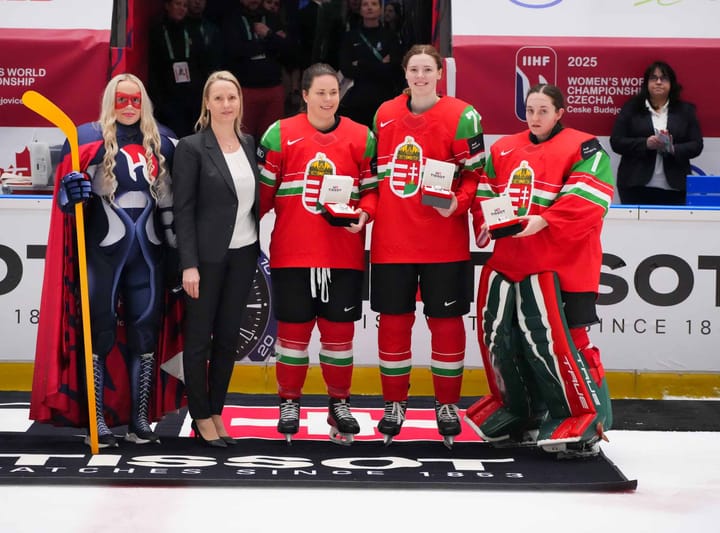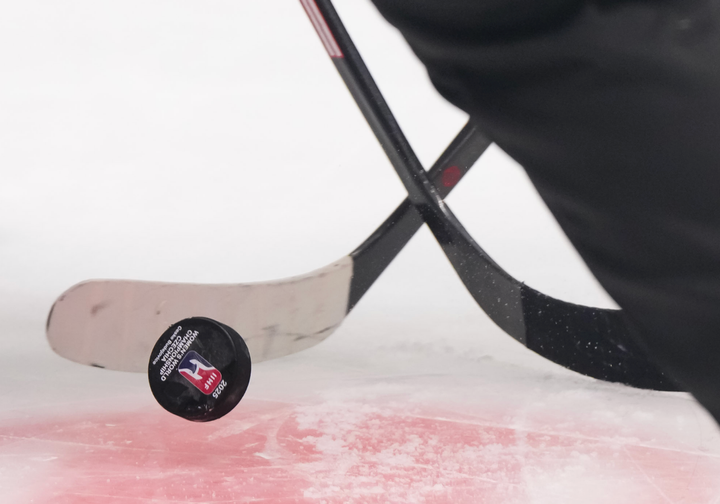Wicked Angles: A Few Notes on Ambivalence
The Professional Women's Hockey League is here, but that doesn't mean that we all should have to forget the history that it's built upon.

Allow me to flex for a second: I've been watching hockey for a long time. It's been almost 20 years since I first fell in love with a sport no one in my family followed, over 16 years since I started writing about it, and over 12 years since I started covering women's hockey in earnest. I've witnessed a lot of chapters in women's hockey history — the CWHL, the NWHL-turned-PHF, the PWHPA — and yet I still haven't uncovered all of them.
With that legacy behind me, I hope those reading this now can understand the whirlwind of emotions I felt upon watching yet another thread unspool itself from the knot, this one labeled "PWHL." After a topsy-turvy summer of announcements, a lull in which no one knew what was happening, and then a deluge of information surrounding branding, sponsors, signings, and scheduling ... it was finally happening. The Professional Women's Hockey League was dropping its first puck of its first-ever regular season.
And despite all of the excitement, there was an ache in my chest and a tear in my eye that had nothing to do with the idea of making history.
While this newest iteration of professional women's hockey is the biggest, shiniest, and most eye-catching, it's far from the first of its kind. Nine years ago now, the National Women's Hockey League (NWHL, the second attempt at a league by this name) had its inaugural puck drop, in front of smaller crowds and fewer national media outlets. Eight years prior to that, the Canadian Women's Hockey League (CWHL) was founded by a handful of players from the first version of the NWHL, which had disbanded that same year (2007) after eight years of its own moderate success. Eight seems to be a number that sticks around when it comes to women's hockey — not that I want that trend to continue, because I really don't want to have to witness another pro league replacing this one in 2032.
Those who have ridden the wave of newfound attention given to women's sports over the past decade might not know this timeline, and that's not their fault. So much of it — I mean, so much — has been lost to lack of preservation. It's rare to find in-depth stats or even games from these eras now, so the holes in the tapestry are large and will likely get larger as the years pass. It's been a huge part of why I still talk about the leagues that came before the PWHL, particularly the PHF (which is probably the closest to the current league that women's hockey has gotten).
The word "narrative" has been used a lot when it comes to the publicity surrounding this new league, and I can't think of a better one to replace it (a cruel reality when you're a writer). There's not really a better way to describe what many feel is a systemic erasure of the paths that meandered around and doubled back to create this current one, especially by some of the same people who embarked on those paths. It's hard to swallow seeing some of the same faces who were keen to make history, in 2015, turn their backs on that history, in 2023, in favor of this new product. And their reasons for that turnabout are many, and it's not my place to tell them how to feel — but it makes it no less difficult to process for those of us who stayed.
It's a similar feeling when it comes to the PWHL. I'll post a photo on social media and get comments like "The on-ice product looks good, but I'll be honest — I'm still bitter about how things happened," referring to the PHF's abrupt buyout in June 2023 by the ownership group that now runs the PWHL. I can't tell those people how to feel. I can't lie and say I'm not still chewing on some of those same sour grapes. It's human to feel this way, and it's hard to let it go, especially when you see stuff like "trailblazing" or "the first women's professional hockey league in North America" like the PHF never even existed.
Those lines and those narratives make the petty Betty in me want to turn my back on this new league, but that would mean turning my back on everything I've been claiming to want for the past few years as a hockey fan. The heightened emotions, the prolonged press coverage, the new serious tack that analysis and reporting have taken from some of the biggest mainstream media outlets in hockey — all of that is simultaneously wonderful to see and tough to swallow as a reporter who never had to jostle for a spot in a media scrum before this — as is the deference given to those outlets over ones like, say, ours.
And HERE WE GO. PWHL era starts... Now. pic.twitter.com/kBJlkp3Eyh
— Founding4Pod (@Founding4Pod) January 1, 2024
The truth of the matter is this: the PWHL is a step up from what we've seen previously. There's no betrayal of the PHF in admitting that, just like there's no betrayal of the CWHL in admitting that the PHF pushed pro women's hockey into new territory. The PWHL is a marked improvement from that first push — in its production, in its management, in its efforts to give players rights and benefits — and yet in the background lie some of the same questions I've been asking of its predecessors for the past eight years.
In every re-imagining of pro women's hockey, there seems to be a common thread of "good enough," one that nags at my need for immense and continual progress. It's why I've been critical of a lot of the smaller things and some of the bigger-picture aspects of the PWHL. This league has made so much hay of being the real-deal, for-the-players league the PWHPA has been asking for that when things fall short, and when the higher-ups ask for leniency and understanding that "this is Year One," I have to laugh and ask, Didn't you buy a pro league? Didn't you say this was going to be better? Was there no consideration of what you inherited, or did you just want to bury the past and act like you knew it all? And I have to bite my tongue and remind myself that no amount of questions like those will change their minds, or the minds of the players who trust that they're in better hands.
Do I think the PWHL has the means and the opportunity to be innovative in more ways than just its rulebook? Yes. Do I have hope that that will happen in the coming years? I'm not sure. Do I have to believe that it will? At this point, I think I do.
Because let's be honest: this has to work. And we have to support it.
We have to support it if we want Buffalo and New Jersey to get teams again. We have to support it if we want expansion to Pittsburgh, Detroit, DC, or Chicago. We have to support it if we want the players to get more money, better benefits, and a stronger CBA. We have to support it if we support sustainable professional women's sports.
It doesn't mean we can't critique it, and critiquing it does not mean we're "focusing on the negative," despite what some would claim. This idea that criticism equals negativity needs to die with 2023, and I refuse to buy into the good-vibes-only bullshit some of my contemporaries want to peddle. But I also refuse to hang onto bitterness anymore.
It doesn't matter what the league is called.
It doesn't matter what came before, though I still want that history honored and respected for the good of the players who helped build it.
At the end of the day, hockey is hockey, and I'm grateful to still be able to cover it. That dulls a bit of the ache in my heart when I think of what we lost to gain this new beginning, but it won't make it disappear, and that's OK.
At this point, the grief I feel is a sign that what we witnessed was worth caring about, and the history will always be worth holding onto.





Comments ()